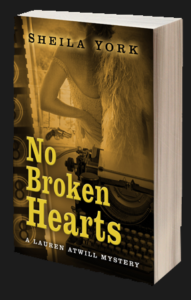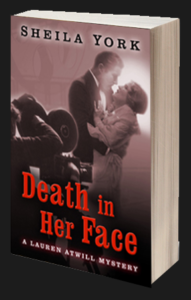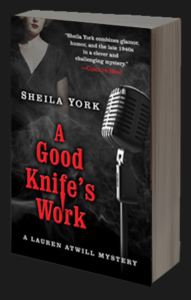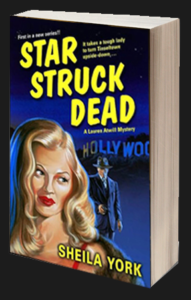Q: Why did you decide to set your series in the 1940s?
A Good Knife’s Work
A: I’m a great fan of Raymond Chandler, and most women who adore Chandler’s books fall a little in love with Philip Marlowe. As a teenager – okay, maybe well after I was a teenager – I fanaticized about what would happen if Marlowe finally met the woman he could love (true fans don’t count his marriage in the last novel). Funny how this woman always looked like me. Finally I sat down and started writing a story about a private detective in the 1940s, but one who lives in the real world. He does divorce work. He doesn’t work solo. He used to work for a gangster. One day he meets a woman in big trouble, a woman who fascinates him. And I decided to tell it from the woman’s point of view. That’s how Lauren Atwill was born.
Q: But your series isn’t noir.
A: No. I like mood, danger, suspense, and there are noir elements scattered here and there, but I don’t have a true noir sensibility. I’m too optimistic. I like happy endings. I like romance. In the traditional noir novel, the woman is either passive or poison. I wanted a heroine who would solve the crimes.
Q: And drive the hero a little crazy?
A: Well, yes, there’s that. I wanted a continuing romantic relationship between Lauren and the PI, Peter Winslow, even if it’s occasionally stormy. His instinct is to protect her. Her instinct is to jump in and do things her own way. Lauren has all the qualities necessary to make her refuse to stay on the sidelines: intense curiosity, fierce loyalty, bravery, stubbornness. Lauren has a stubborn streak the size of Nebraska.
Q: How did you decide to make Lauren a screenwriter?
A: She had to be independent. That meant her own income, it meant a good job. And of course, I wanted her to work in Hollywood. All that glamour, all that money, all that license, all that sex, the perfect field of play for murder and mayhem. And she could use her insider knowledge to solve the killings. But she couldn’t be an actress. She needed to be someone who worked under the radar. She ended up being not only a screenwriter, but largely a script doctor. Talk about under the radar. Nobody gets less credit than a script doctor.
Q: You’re a big fan of movies then.
A: I love movies. Movies from all periods, but I’m particularly intrigued by the late 1940s, which is the twilight of the great golden age of film, when stars were still gods, when studios were still powerful, had distinct identities, and ran (and ruined) lives. And just before TV changed things forever.
Q: A Good Knife’s Work takes place in New York. Why there, and not LA?
A: I’m cursed with logic. My idea for A Good Knife’s Work, the second Lauren novel, was to send her into another part of the entertainment business that was headed into its twilight – radio drama. But logically, how could she go undercover as a radio writer in LA? Her face was plastered all over the LA papers as result of the first book, Star Struck Dead.
Q: As A Good Knife’s Work takes place in the world of radio mysteries, are you a big fan of those, too?
A: I am now. When I began my research, I didn’t know much about them. I was curious certainly about how they created complete reality with only sound – but I became a real fan after meeting some actors in New York who recreate old-time mysteries: the WWOW Radio troupe. They would perform scripts before a live audience as if they were broadcasting from a studio in the old days. Once in a while, they would invite me to perform with them. The troupe is semi-retired now.
Q: You acted with them?
A: Once a season or so. I can do a variety of accents and voices. It was terrific fun. And a real challenge. Sometimes you have to switch characters in the space of a couple of lines, exactly the way it’s portrayed in A Good Knife’s Work.
Q: Was the Adam Drake detective series in A Good Knife’s Work based on a real-life series?
A: No, but I drew inspiration from my favorites: Sam Spade, Broadway Is My Beat, Richard Diamond, and Pat Novak, For Hire, which by the way has some of the most outrageously wonderful similes.
Q: You’ve made a nod to period mystery novels in A Good Knife’s Work as well. It even has a floor plan.
A: I just had to write a book with a floor plan in it! As a kid, I would buy books on that alone! Pure heaven!
Q: Is the solution in the floor plan?
A: I can’t tell you that! Let’s just say it contributes more than a nod to the past.
Q: Speaking of homage, is “Lauren” a tribute to Lauren Bacall?
A: Of course. An affectionate and admiring tip of the hat to Miss Bacall. But I had to rationalize how my heroine, who is a decade older in the books than Miss Bacall was in 1946, would have that unusual name. So I made Lauren my heroine’s middle name – her mother’s maiden name – one she adopts professionally. Lauren’s real first name is actually Mabel, a good, old-fashioned name. That’s a tribute to my mother.
Q: Were your parents an influence on your writing?
A: My parents certainly influenced my love of reading. They were big readers. Two newspapers a day. Magazines. Book of the Month Club. I discovered a lot of writers that way. My father was a career army officer, and we traveled a lot. I’d lived in six different places by the time I was ten. Three years of that was in Germany. I got a broader experience of people and places than most kids get, certainly at that period of time. Maybe the traveling made me more willing to take a flyer on writing a story set in a place on the other side of the country.
Q: You had a long career as a radio disk jockey too. Don’t they usually travel around?
A: True. Disk jockeys don’t tend to stay in one place throughout their careers. I was in graduate school at the University of Tennessee in Knoxville and was about to get out of the clinical psychology program, for which I discovered I was not in any way suited after only one year. I got a job working on a local radio station, just because I had a good voice. They took such a chance on me. But I ended up spending 20 years doing that, finally settling in New York. I live in New Jersey now. Curiously, after all those years of traveling, my husband and I ended up buying a home not ten miles from where my parents were living when I was born.
Q: How hard is it for you to write?
A: I’m a champion procrastinator. I’ve heard a few other writers, usually on panels at mystery conventions, tell readers that sometimes the characters just take over and the book seems to write itself. I want to say, ‘Please, please, if you have any of those characters to spare, send them over to me.’ My writing process consists of: stare at the monitor, get up, talk to myself, get an idea, sit down, write a phrase, repeat. Sometimes things go faster: I get to sit for fifteen minutes. My attempts to write on paper pads – on legal pads during my commute or on small notebooks I keep in my handbag for moments of sudden inspiration – have had mixed results because I have the worst handwriting. Even I can’t read it. My husband finally bought me a tiny recorder so I’d stop showing him my notes and asking: “What does this look like to you?”
Q: You write snappy dialog. How do you do that if you’re up and down all the time?
A: I couldn’t write it any other way. I have to get up and act it out. I’ve had a little experience in theater, and I think that makes it easier for me to find the rhythm if I’m playing all the parts. There’s a discipline in theater. In good plays, the characters can’t ramble. You say it, you mean it, you move on.
Q: Which writers have influenced you the most?
A: That’s an interesting question, because it’s more complicated than it first appears. There’s a difference between the writers who made you love to read and think you might want to write yourself, and those whose work you learned from and continue to learn from. I read all the Nancy Drew novels as a kid, but I didn’t learn a darned thing about how to write from them. I read Mary Stewart (before her Merlin books) voraciously as a teenager. She can transport you with her descriptions.
Daphne du Maurier and Dorothy Sayers excel at setting mood and place. They got me thinking about writing all those years ago, so they influenced me greatly. But my style is nothing like theirs. New writers often start out copying the style of their favorites, then quickly find they’re no good at that, and find their own voice.
Among the other classic writers whose work I still learn from – who have a sensibility and momentum that still work today – I’d say Rex Stout would be right up there on the list. His Nero Wolfe stories move right along, and he created the strong core of continuing supporting characters that define what successful series are. Some of his peer group’s work – while terrific – has a lot of detail and layering that you can’t use anymore.
Q: Do you think it’s because readers have such short attention spans?
A: Our attention spans are certainly shorter, and I’m occasionally frustrated when I watch broadcasts of live artistic events because the director won’t hold a shot for more than three seconds. But I’m not one of those people who feels like everything was better in the good old days. Even though I write about those days. We live in a more visual age. So writers don’t need to stop and describe as much as they used to. A writer has to work toward paring to the essentials. It reminds me of that great line from Get Shorty: “I’m not going to say any more than I have to, if that.” Elmore Leonard. Now that’s a person to study for dialog. He can have two people of very similar backgrounds talking, and yet they speak with distinct, subtle difference. He’s remarkable. I think I got off the question. Talk about short attention spans.
Q: Then maybe we should wrap it up. What’s next for Lauren?
A: She’s going back to LA. A starlet is missing and a gangster’s dead, and the studio needs Peter’s expertise – and discretion – to find her before the cops charge her with murder. You can bet Lauren will be neck-deep in it before Peter can strap on his gun.



